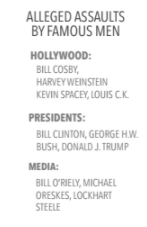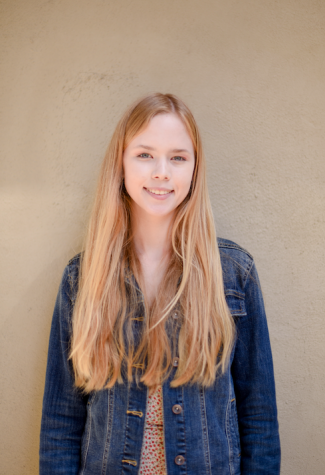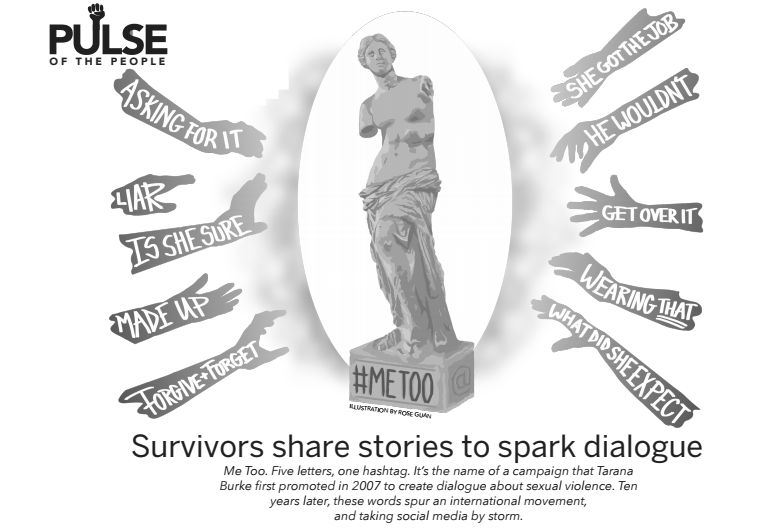Pulse of the People: Survivors share stories to spark dialogue
Burke launched the Me Too campaign in 2007, but the movement entered the realm of hashtags last month when actress Alyssa Milano posted the hashtag, along with a call for women to share their experiences of sexual assault on social media.
Since then, activists, celebrities and politicians have advocated for the hashtag, and survivors across the world are using it to share their stories of sexual assault and spark dialogue.
“It means a lot because meeting people [who share your experiences] helps you cope with it,” Jenna Sadhu (12), who posted #MeToo on Twitter, said. “It’s not about sympathy—nobody came up to me and said ‘I’m so sorry.’ It’s ‘wow, I’m really inspired that you could do that.’”
Milano helped popularize the hashtag in the midst of a New York Times investigation of sexual assault allegations against film studio executive Harvey Weinstein, whom the Weinstein Company fired on Oct. 8. In the following weeks, various women alleged that Weinstein had sexually assaulted them.
Weinstein currently faces no charges of sexual assault.
“As of now, Harvey Weinstein being kicked out of the academy has been the only type of accountability that he’s had,” said Chardonnay Madkins, the project manager for sexual assault advocacy nonprofit End Rape on Campus (EROC). “People’s protections being revoked and taken away—that’s one important thing coming from this conversation. It’s just a centimeter, and we need to move a foot, but we’re gaining a little bit of traction. We just need to push further.”

While many advocates are speaking out against the culture of assault in Hollywood and the entertainment industry, survivors have also shared their experiences to create dialogue regarding sexual assault in other fields.
On Oct. 19, Olympian and member of USA gymnastics team McKayla Maroney shared her #MeToo story through Twitter. On Oct. 27, California congresswoman Jackie Speier recounted her story of sexual assault on Capitol Hill to expand the campaign by launching the #MeTooCongress hashtag.
“The #MeToo movement has highlighted how many people are impacted by sexual violence,” said EROC co-founder Annie E. Clark, whose campus sexual assault documentary “The Hunting Ground” garnered critical acclaim. “It allows us to go across industry-—venture capitals, women in tech, Hollywood, campuses. We’re not isolating this to one person or one industry; it’s everywhere. To recognize it as such is incredibly important.”
The #MeToo campaign has prompted women across the world to share their experiences and speak out against sexual assault. Variations of the hashtag have appeared internationally, from #BalanceTonPorc (#SnitchOutYourPig) in France to #QuellaVoltaChe (#ThatTimeWhen) in Italy. The movement has also taken effect internationally in other ways—according to representatives from sexual violence survivor advocacy groups in Israel, including the Association of Rape Crisis Centers and the gender equality organization Na’amat, the number of Israeli women reporting cases of sexual assault has increased substantially in recent weeks.
In addition, in the month following the investigation of Weinstein, various other accusations arose surrounding men in executive positions across industries: “men of privilege and power,” as the movement calls them.
On Oct. 30, actor Anthony Rapp shared his #MeToo story, accusing actor Kevin Spacey of sexual assault. Within the next few days, Netflix cancelled the Netflix original “House of Cards”, which Spacey stars in, and Spacey’s publicists and PR company rescinded his contract. On Nov. 1, NPR head of news Michael Oreskes resigned amid sexual assault allegations filed by former coworkers.
“Most media outlets tend to see these stories episodically. They focus on one fragment of society and fail to connect the dots that it’s a larger cultural problem,” Clark said. “Unless there is accountability, we will see something like this pop up in five years. The question should not be asked of survivors but of perpetrators. The problem isn’t awareness, it’s accountability.”

The #MeToo movement also sparked discussion about women’s healthcare and survivors’ access to protective resources. Starting on Oct.6., the Trump administration began eliminating requirements for insurance companies’ plans to cover birth control and cut funding for programs that provide emergency aid to sexual assault survivors.
“There’s so many things that can be done to improve women’s access, especially for survivors,” Miquel Davies, a public policy fellow for the National Women’s Law Center, said. “Ensuring access to healthcare—emergency care, contraception and abortion after someone experiences an act of violence. Supporting women’s choices after an act of sexual violence.”
Men respond with #HowIWillChange
The #HowIWillChange hashtag joined the movement against sexual violence on Oct. 17 after writer Benjamin Law posted a string of messages to his Twitter followers as a response to the #MeToo campaign.
“Guys, it’s our turn,” Law wrote. “After yesterday’s endless #MeToo stories of women being abused, assaulted and harassed, today we say #HowIWillChange.”
In the following weeks, men across social media platforms pledged to take steps to support survivors of sexual assault. Both men and women have also acknowledged the importance of speaking out in support of male survivors of sexual violence.
“This shouldn’t be on the backs of survivors, it should be on all of us–we also need allies,” Clark said. “Making sure that men are involved, men of privilege and power, but also deferring to the voices of those most affected.”
This piece was originally published in the pages of The Winged Post on November 16, 2017.
Prameela Kottapalli (12) is the Editor-in-chief of the Winged Post. She enjoys spending time with her fellow staff members...

Irina Malyugina (11) is the photo editor of Harker Aquila and the Winged Post. This is her third year on staff. She has a passion for visual storytelling...
Rose Guan (10) is a copy editor for the Winged Post in her second year on staff. She was a reporter in her freshman year, and her favorite aspect of journalism...
Anika Rajamani (12) is a reporter for the Winged Post. This is her fourth year on staff. Outside of journalism, she loves to dance. Anika also loves to...
Helen Yang (12) is the Arts & Entertainment Columnist for Harker Aquila and Winged Post. She sees journalism as an opportunity to interact with and...


















![“[Building nerf blasters] became this outlet of creativity for me that hasn't been matched by anything else. The process [of] making a build complete to your desire is such a painstakingly difficult process, but I've had to learn from [the skills needed from] soldering to proper painting. There's so many different options for everything, if you think about it, it exists. The best part is [that] if it doesn't exist, you can build it yourself," Ishaan Parate said.](https://harkeraquila.com/wp-content/uploads/2022/08/DSC_8149-900x604.jpg)




![“When I came into high school, I was ready to be a follower. But DECA was a game changer for me. It helped me overcome my fear of public speaking, and it's played such a major role in who I've become today. To be able to successfully lead a chapter of 150 students, an officer team and be one of the upperclassmen I once really admired is something I'm [really] proud of,” Anvitha Tummala ('21) said.](https://harkeraquila.com/wp-content/uploads/2021/07/Screen-Shot-2021-07-25-at-9.50.05-AM-900x594.png)







![“I think getting up in the morning and having a sense of purpose [is exciting]. I think without a certain amount of drive, life is kind of obsolete and mundane, and I think having that every single day is what makes each day unique and kind of makes life exciting,” Neymika Jain (12) said.](https://harkeraquila.com/wp-content/uploads/2017/06/Screen-Shot-2017-06-03-at-4.54.16-PM.png)








![“My slogan is ‘slow feet, don’t eat, and I’m hungry.’ You need to run fast to get where you are–you aren't going to get those championships if you aren't fast,” Angel Cervantes (12) said. “I want to do well in school on my tests and in track and win championships for my team. I live by that, [and] I can do that anywhere: in the classroom or on the field.”](https://harkeraquila.com/wp-content/uploads/2018/06/DSC5146-900x601.jpg)
![“[Volleyball has] taught me how to fall correctly, and another thing it taught is that you don’t have to be the best at something to be good at it. If you just hit the ball in a smart way, then it still scores points and you’re good at it. You could be a background player and still make a much bigger impact on the team than you would think,” Anya Gert (’20) said.](https://harkeraquila.com/wp-content/uploads/2020/06/AnnaGert_JinTuan_HoHPhotoEdited-600x900.jpeg)

![“I'm not nearly there yet, but [my confidence has] definitely been getting better since I was pretty shy and timid coming into Harker my freshman year. I know that there's a lot of people that are really confident in what they do, and I really admire them. Everyone's so driven and that has really pushed me to kind of try to find my own place in high school and be more confident,” Alyssa Huang (’20) said.](https://harkeraquila.com/wp-content/uploads/2020/06/AlyssaHuang_EmilyChen_HoHPhoto-900x749.jpeg)




